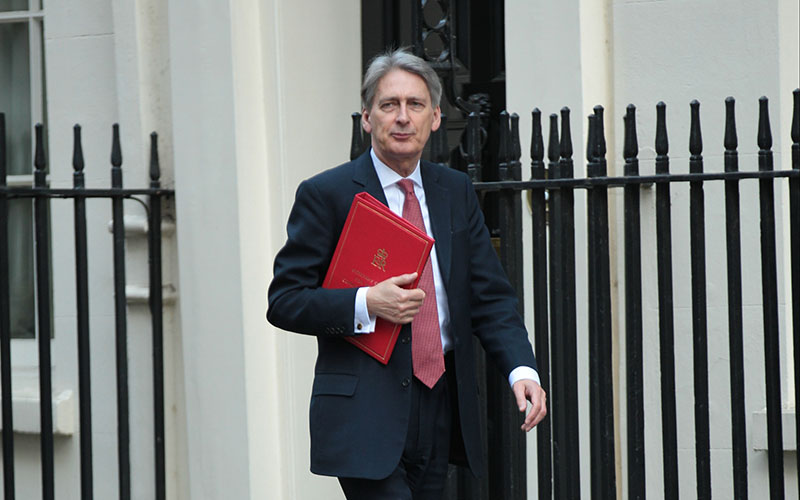Chancellor extends off-payroll rules to private sector

The chancellor has followed through on plans to extend controversial off-payroll rules into the private sector.
In his Budget speech, chancellor Philip Hammond committed to the rules, which were implemented in the public sector in April 2017, being extended to the private sector. The planned extension has been met with opposition by the industry.
The off-payroll rules initially made public sector end-clients responsible for determining whether a worker who operates through a personal service company or other intermediary is caught by IR35 or is genuinely self-employed. Where the worker is caught by IR35, the rules also makes the fee payer, which will often be a recruitment agency, responsible for deducting and then paying the worker’s tax, NI and employer’s NI.
However, there was a crumb of comfort for recruiters with the chancellor revealing the extension will be delayed until April 2020, and only apply to larger and medium-sized businesses.
In a speech in which the chancellor also claimed austerity was coming to end, Hammond revealed the UK’s 2018 growth forecast has been upgraded by the Office for Budget Responsibility (OBR) from 1.3% to 1.6%, while there are now 3.3m more people in work than in 2010 and wage growth is at its highest in almost a decade.
Some of the other measures announced by the chancellor included:
- Small businesses’ contribution to the Apprenticeship Levy to be cut from 10% to 5%
- Business rates bill for companies with a rateable value of £51k or less to be cut by a third over two years
- £900m in business rates relief for small businesses
- A minimum extra £2bn a year for mental health services, with a new mental health crisis centre providing support in every accident and emergency unit in the country
- A £30bn package for England’s roads, which will include repairs to motorways and potholes
- A 30% increase in infrastructure spending
- a renewed remit for the Low Pay Commission beyond 2020
Reaction
IR35 extension
Commenting on the extension of the IR35 rules into the private sector, Samantha Hurley, operations director at the Association of Professional Staffing Companies (APSCo) and co-chair of HMRC’s IR35 Forum, said: “While we maintain that extending changes around off-payroll working to the private sector will have an adverse impact on the strength of the UK’s labour market and wider economy, we welcome the fact that HMRC and HMT have taken on board the advice of APSCo and other influential bodies that it was wholly unfeasible to introduce changes as early as April 2019.
“When APSCo met with Rt Hon Mel Stride MP to discuss the concerns of our members during the consultation period, one point he couldn’t fail to take on board was the need to give businesses – including those in the recruitment sector – enough time to properly prepare for any change.
“There is no doubt that the timeframe is still tight, and we would have hoped to see draft legislation before next summer. However, organisations will at least have a clearer idea from the upcoming consultation on the detail of the changes to enable them to upskill their workforces to be able to make appropriate status determinations and to get their internal processes and IT systems in order, to cope with the new rules.”
Meanwhile Colin Morley, professional services director at international recruiter Harvey Nash Recruitment Solutions, said businesses and contractors across the country could breathe a sigh of relief, though not for very long.
“The government's decision to delay the introduction of the new IR35 rules to the private sector until 2020 shows that they've listened to the warning of experts and industry leaders: That IR35, in its current state, will hurt innovation, productivity and ultimately the economy. We hope HMRC will take this period to reflect upon the deeply flawed regulation and make the necessary adjustments to support, not hinder, the UK’s business and contractor communities. However, contractors and end users must prepare for the substantial changes afoot, opening dialogue, re-evaluating scope and expanding networks to support substitution.”
Adrian Marlowe, chairman of the Association of Recruitment Consultancies (ARC), said the delay in the roll-out was very welcome: “This should allow time for a review of the position post-Brexit, as well as an opportunity for the government to complete its assessment of the employment status rules that were subject to consultations earlier this year. As IR35 relies on employment status tests, it makes sense to have those finalised before any further change.
“While the government is right to collect tax where it is being avoided, the current rules are confusing and give rise to unfairness in many cases, not the least where contractors operate a genuine business that would normally be entitled to tax reliefs. We at ARC have argued for various alternatives, all of which would take the stress for hiring businesses out of the equation and retain key points of principle.”
Julia Kermode, CEO of trade body The Freelancer & Contractor Services Association, said the chancellor’s decision to delay roll-out until 2020 shows that the Treasury has listened to the concerns of stakeholders who have been campaigning hard and will give time for organisations to work more with policymakers to ensure they get it right: “A delay will give businesses and freelancers time to prepare for the inevitable complexities of implementation.
“In an interesting move, the chancellor decided to level the playing field between public and private sectors, but only for large and medium businesses, thus letting SMEs off the hook. This is somewhat foolhardy given that large businesses are precisely the ones that are least well-placed to accommodate the change due to the impact on their IT infrastructure should they need to process deemed payments to their contractors. The reforms dictate complexities in paying off-payroll workers’ invoices that require both accounts payable and payroll software to ‘talk to’ each other – functionality that most large businesses simply do not have.
“What’s more, we will undoubtedly see an exponential proliferation of tax avoidance schemes as an inevitable consequence, as we have seen in the public sector. With a reduction in income, large numbers of contractors working in the public sector have been enticed by non-compliant tax avoidance schemes that reduce their tax and NI contributions by disguising remuneration as ‘something else’ such as annuities, loans or even marketing vouchers. However, the reality is that the tax and NICs will still be due and HMRC will pursue the individual for this, and with interest, and however tempting, contractors must resist such schemes. We will continue lobbying for all such schemes to be stamped out before any IR35 reforms in the private sector.”
Meanwhile, Dave Chaplin, CEO and founder of contracting authority ContractorCalculator, called the roll-out “premature” as the full facts of the public sector impact have yet to have been established, which won’t be known until the middle of 2019.
“By then we expect to see evidence that the reforms have been damaging to the public sector, raised costs, and effectively resulted in a net loss. The chancellor appears to have believed the misleading rhetoric emanating from the Treasury and HMRC on this matter and it is still incredibly worrying that, in the face of strong opposition to the off-payroll rules, and with the consultation process yet to be concluded, the chancellor has made this announcement.
“While the fiscal impact of the reform for the taxman is still unknown, one certainty is that a private sector rollout will prove incredibly costly for UK firms and for a government that claims to be pro-business, this extra tax will slap an additional 10% onto the cost of hiring flexible workers for growing businesses that are unable to afford full-time workers. We shall keep campaigning vociferously to bring an end to these ill-conceived rules, which will be hugely damaging to the UK economy.”
Crawford Temple, CEO of PRISM, called the roll-out very disappointing in light of all the evidence now emerging that contradicts HMRC’s view of the roll out in the public sector: “He has missed a real opportunity to reform the tax system for the world of modern employment, choosing instead to apply yet another sticking plaster.
“2019 was always going to be a big call as this clashed with Brexit so 2020 seemed the most likely option. This timeframe afforded the chancellor other options to reform the tax system which he has failed to recognise. This shows a real lack of understanding of business and a lack of ambition to build a tax framework fit for a post-Brexit world.”
Also commenting, Nigel Morris, employment tax director at accountancy firm MHA MacIntyre Hudson, said: “What’s concerning is that the consultation this move is based on is too narrow in scope, ruling out some previous options that had real merits. The government needs to be open minded in how it delivers continued IR35 reform, the public sector roll out has not gone smoothly and it’s important these lessons are taken on board.”
Jo Sellick, managing director at agency Sellick Partnership, said the roll-out would have massive implications for recruiters: “Hammond’s fleeting reference to rolling out IR35 to the private sector is a huge move and will have massive implications for the recruitment industry. It will put a huge strain on our contract and interim workforce and this may well deter candidates from going down that path, potentially forcing them to favour permanent roles instead and creating worrying implications for the temporary sector.”
Apprentices
With regard to the chancellor’s announcement regarding apprentices, Azmat Mohammed, director, The British Institute of Recruiters, said: “The announcement by Philip Hammond that the 10% fee that small businesses must pay when they take on apprentices will be halved is very welcome. Recruiting apprentices on to apprenticeship programmes can be challenging when SMEs feel the charges are too high. This is a huge step in the right direction towards abolishing these fees altogether.”
On proposed changes to the Apprenticeship Levy, Recruitment & Employment Confederation CEO Neil Carberry said: “The recognition that the Apprenticeship Levy must be more flexible and work better for employers is good news. Reducing the contribution levels for SMEs will help, but it’s disappointing that we still lack the flexibility needed to ensure training is available for temporary staff. All workers should have opportunities to progress, irrespective of what type of contract they are on. We want to work with government to ensure that the levy works better for employers and for all workers who want to upskill.”
Ben Rowland, co-founder of apprenticeships provider Arch Apprentices, added: “Arch Apprentices are delighted by the government’s proposal to announce a £695m initiative to help small firms hire apprentices, with their proposed contribution now reduced from 10% to 5%. We have been strong advocates of the apprenticeship reforms that the government has introduced, and truly believed that they will have a big impact on resolving the growing skills gaps in the UK.”
Low Pay Commission recommendations
With regard to plans to drive wage growth for those on the lowest pay, and a renewed remit for the Low Pay Commission beyond 2020, REC director of policy Tom Hadley said: “We welcome the fact that the government has accepted the Low Pay’s Commission recommendations for the new National Living Wage and National Minimum Wage rates and announced its consultation on a continued remit beyond 2020. It is crucial that NMW rates continue to be based on evidence and not politics, as that is in the interest of workers and businesses alike.”
Mental healthcare spending
With regard to the additional funding for mental healthcare services, Michael Johnson-Ellis, MD of agency Healthier Recruitment, said: “We applaud the chancellor’s decision to inject extra funds into mental health crisis services, an area which hasn’t received its fair share of funding increases over the past five years. However, cash alone will not guarantee better patient outcomes: it is absolutely vital that any additional resources are directed in the most efficient way.”
• Comment below on this story. You can also tweet us to tell us your thoughts or share this story with a friend. Our editorial email is [email protected]




